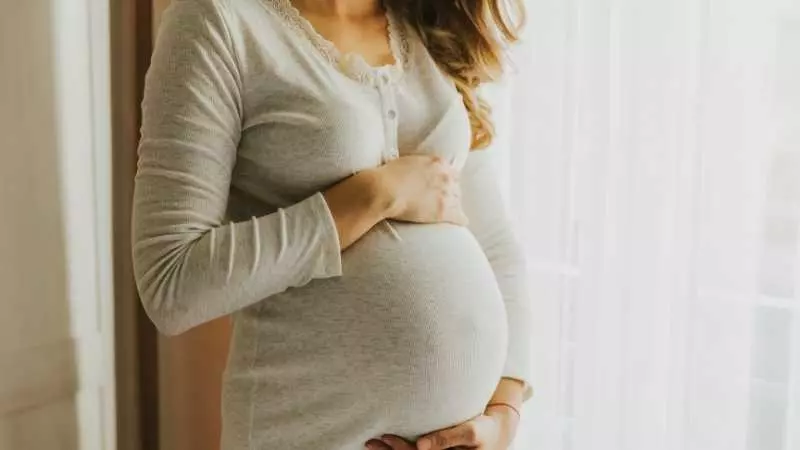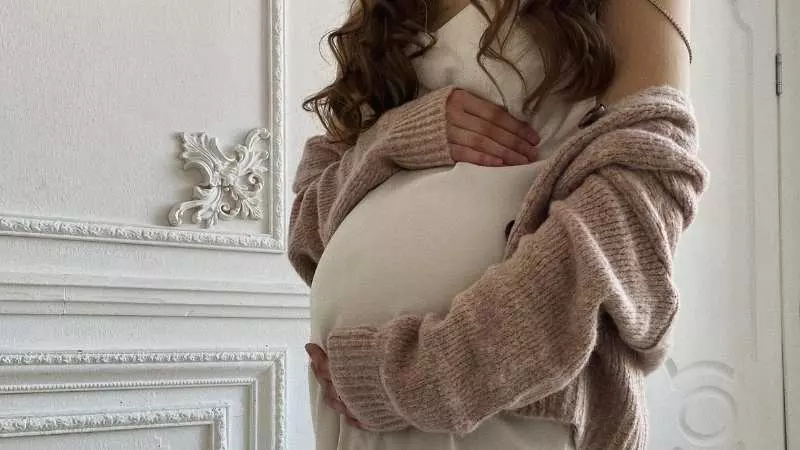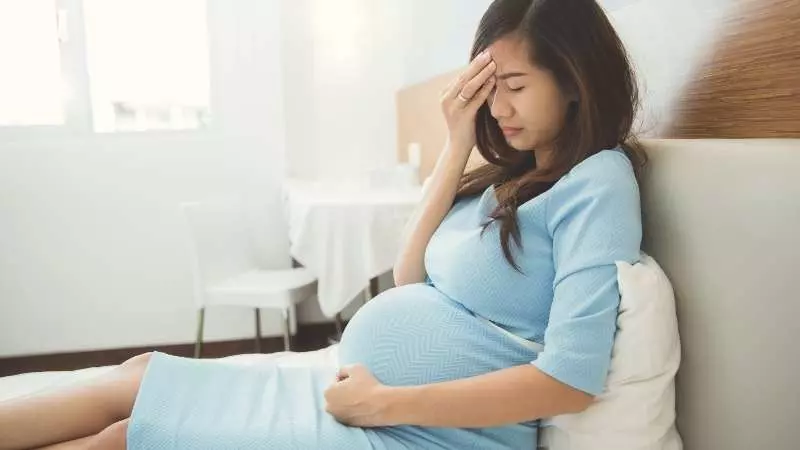What causes hair loss during pregnancy? You might have come across the idea that hair becomes thicker and more lustrous during pregnancy. This holds true for some women due to elevated levels of the hormone estrogen, which reduces hair shedding.
On the flip side, some expectant mothers notice thinning hair or experience hair loss either during pregnancy or shortly after giving birth.
Although it can be worrying, hair loss is a normal occurrence and can stem from factors such as hormonal changes, physical stress, or medical conditions associated with pregnancy.
What Causes Hair Loss During Pregnancy?
On average, both men and women shed around 50 to 100 hairs daily. Pregnancy, however, brings about a change as escalating estrogen levels decelerate the natural shedding cycle of hair follicles. Consequently, some women might experience a decrease in hair loss during pregnancy. Yet, this isn’t universally true.
1- Health Issues

Similarly, pregnancy can lead to health issues such as telogen effluvium, resulting in significant hair shedding, particularly if it’s linked to an ongoing hormonal or vitamin imbalance.
Thyroid Problems
Detecting thyroid disorders like hyperthyroidism (excessive thyroid hormone) or hypothyroidism (insufficient thyroid hormone) during pregnancy can be challenging.
Among these disorders, hypothyroidism is more prevalent, affecting about 2 to 3 out of every 100 pregnant women. Hair loss, along with symptoms such as muscle cramps, constipation, and fatigue, can indicate this condition. Additionally, around 1 in 20 women may experience thyroid issues (postpartum thyroiditis) after childbirth, typically diagnosed through a blood test.
Iron Deficiency
Iron deficiency occurs when there aren’t enough red blood cells to transport oxygen to body tissues. This can lead to hair thinning along with symptoms like fatigue, irregular heartbeat, shortness of breath during exertion, and headaches.
Pregnant women, especially those with closely spaced pregnancies, carrying multiples, or experiencing severe morning sickness, are at an increased risk of developing iron deficiency anemia. Diagnosis typically involves a blood test.
Although hair loss due to these conditions isn’t permanent, hair thickness may not fully return to normal until hormone or vitamin levels normalize.
2- Hormonal Changes

Some women might undergo hair thinning and shedding due to stress or shock, a condition known as telogen effluvium, which affects a small percentage of women during pregnancy.
During the first trimester, the body experiences stress as hormonal balance undergoes significant shifts to support the developing baby. This stress can push more than 30 percent of the hair on your head into the telogen or “resting” phase of the hair growth cycle. Consequently, instead of the usual 100 hairs lost daily, you may lose up to 300 hairs a day.
Hair loss resulting from hormonal changes may not manifest immediately; it may take between two to four months to observe thinning. However, this condition typically doesn’t persist beyond six months and doesn’t lead to permanent hair loss.
3- Postpartum Hair Loss

Several women notice hair loss a few months after giving birth, typically reaching its peak around four months postpartum. This isn’t true hair loss but rather “excessive hair shedding” triggered by a decrease in the hormone estrogen.
This type of hair loss is categorized as telogen effluvium. Although witnessing the shedding of 300 or more hairs daily can be alarming, it generally resolves without treatment.
4- Trauma

Your hair loss might not be linked to pregnancy or genetic factors at all. If you’ve recently worn tight hairstyles, undergone specific beauty treatments, or treated your hair harshly, you could be experiencing traction alopecia.
Inflammation of hair follicles can result in hair shedding and loss. In severe cases, follicle inflammation can cause scarring and permanent hair loss.
5- Other Causes
It’s crucial to understand that hair loss associated with telogen effluvium typically results in even thinning across the scalp. If you observe patches or significant balding, there may be other underlying issues. Additionally, genetic and autoimmune conditions can lead to hair loss regardless of pregnancy status.
Androgenic alopecia, also known as female pattern baldness, occurs due to a shortened growth phase of hair follicles and an extended period between hair shedding and new growth.
Alopecia areata causes patchy hair loss on the scalp and sometimes on other parts of the body. Hair loss and regrowth can be unpredictable or cyclical in this condition. While there’s no cure for alopecia areata, certain treatments may help prevent further loss and stimulate hair regrowth.
It’s possible to experience pregnancy alongside one of these hair loss conditions.
Treatment of Hair Loss During Pregnancy
Hair loss during and after pregnancy often requires no specific treatment as it typically resolves naturally over time.
In cases where hair growth doesn’t return to normal levels, doctors may consider prescribing minoxidil (Rogaine). However, this medication is not deemed safe for use during pregnancy.
For conditions such as hypothyroidism or iron deficiency anemia, working with your doctor to find suitable medication or vitamin supplements to restore normal levels can kickstart the hair regrowth cycle over time.
Most treatments for other conditions like androgenic alopecia are not recommended during pregnancy. Your doctor might suggest trying low-level laser treatment (LLLT), which uses red light waves to stimulate hair growth, as an alternative to medications.
Postpartum Hair Loss: What Happens After Giving Birth?
Certain medications are deemed safe during breastfeeding while others are not. For instance, Rogaine is considered unsafe for breastfeeding mothers and is typically recommended post-nursing.
Your primary source of information should be your doctor, who can assist you in evaluating the advantages and disadvantages of various treatment options.
Preventing Hair Loss Related to Pregnancy
You may or may not be able to take preventive measures against hair loss or shedding during pregnancy, as it depends on the underlying cause of your hair loss.
Try:
- Maintaining a healthy, balanced diet rich in protein, iron, and essential nutrients. Consult your doctor about the most suitable prenatal vitamin, whether over-the-counter or prescribed.
- Consulting your doctor about any medications or supplements that might contribute to hair loss.
- Avoiding tight hairstyles like braids, buns, and ponytails that can tug at your hair. Refrain from twisting, pulling, or rubbing your hair excessively.
- Gently washing your hair and using a wide-toothed comb to detangle without causing excessive pulling.
- Allowing your hair to rest without subjecting it to harsh treatments such as hot rollers, curling irons, hot oil treatments, or permanent styling.
- Seeking medical advice from your doctor, as some causes of hair loss may require specific treatments to address vitamin deficiencies or hormone imbalances.
- If you’ve experienced hair loss, consider using volumizing shampoos and conditioners to add fullness. Avoid heavy formulas that can weigh down your hair. Focus on conditioning the ends rather than the scalp for added lift.
- Opting for haircut styles like a short bob that can create the appearance of fuller hair while it grows back.
You might be interested in: ”10 Best Hairstyles For Thinning Hair”






